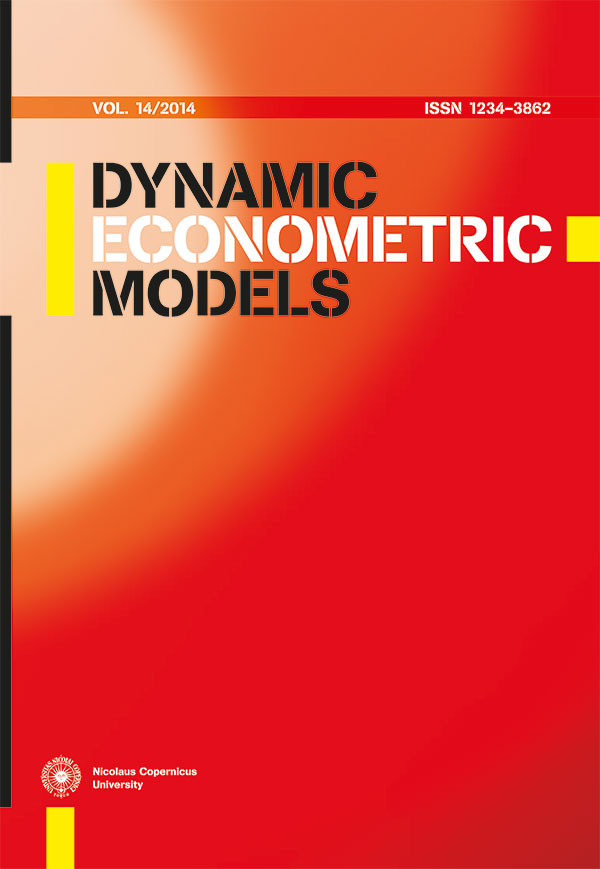Energy Consumption and Economic Growth in Ethiopia: Evidence from ARDL Bound Test Approach
DOI:
https://doi.org/10.12775/DEM.2019.004Keywords
Key phrases, economic-growth, energy-consumption, ARDL, Ethiopia, causalityAbstract
The present study aims to investigate the dynamic relationship between economic growth and energy consumption. Specifically, the study tries to answer the questions whether energy consumption has any significance effect on economic growth of the country and it also determined the magnitude of the effect. In doing this, the study used an ARDL bound test approach to analyze Ethiopian data from 1970 to 2017 with real GDP as a function of energy consumption, human capital., physical capital., trade openness and policy change dummy. To do so, secondary data were obtained from WDI, UNCTAD stat and NBE. Co-integration test approves the existence of long-run relationship among the variables. Moreover, the estimation result reveals that, energy consumption found statistically insignificant in affecting economic growth in the long-run. However, it was positive and statistically significant in short-run. Likewise, the dummy variable incorporated to capture the policy change found insignificant in long-run and with positive significant result in short-run. Also, we applied the Granger causality test in linear multivariate models to evaluate how important is the causal impact of energy consumption on economic growth. The results give the evidence of causality running from economic growth to energy consumption supporting “conservation hypothesis”, implying that reducing energy consumption may be implemented with little or no adverse effect on economic growth. Hence, this study recommended the policy makers to improve the existing policies on energy consumption so as to enhance the level of efficiency in the energy sector i.e. energy regulation policies supporting the shift from lower-quality to higher-quality energy services.References
Akinlo, A.E. (2008). Energy Consumption and Economic Growth: Evidence from 11 African Countries. Energy Economics, 30, 2391–2400. http://dx.doi.org/10.1016/j.eneco.2008.01.008
Amirat, A. & Bouri, A. (2010). Energy and Economic Growth: The Algerian Case, type-written.
Chontanawat, J., Hunt, L. & Pierce, R. (2008). Does Energy Consumption Cause Economic Growth? Evidence from Systematic Study of over 100 Countries. Journal of Policy Modelling, 30, 209–220. http://dx.doi.org/10.1016/j.jpolmod.2006.10.003
Easterly, W. (1993). How Much Do Distortions Affect Growth? Journal of Monetary Economics, 32(2), 187–212.
Ebohon, O. J. (1996). Energy, Economic Growth and Causality in Developing Countries: A Case Study of Tanzania and Nigeria. Energy Policy, 24, 447–453.
EEA (2009). Problems and Prospects of Energy Sector in Ethiopia. Bulletin of the Ethiopian Economic Association, 3(5), 7–11.
Enders,W. (1996), Applied Econometric Time Series, Lowa State University: John Wiley & Sons INC.
Engle, R.F. & Granger, C.W.J. (1987). Cointegration, Error Correction Representation, Estimation and Testing. Econometrica, 55, 251–276.
Ghali, K.H. & El-Sakka (2004). Energy Use and Output Growth in Canada: a Multivariate Cointegration Analysis. Energy Economics, 26, 225–238. http://dx.doi.org/10.1016/S0140-9883(03)00056-2
Granger, C.W.J. (1988). Causality, Co-integration, and Control. Journal of Economic Dynamics and Control, 12, 551–559.
Harris, R. (1999), Using Co-integration Analysis in Econometric Modeling, London: Prentice-Hall.
Jumbe, C.B.L. (2004). Co-integration and Causality between Electricity Consumption and GDP: Empirical Evidence from Malawi. Journal of Energy Economics, 26(1), 26–68.
Johansen, S. and K. Juselius (1990), Maximum Likelihood Estimation and Inference of Co-integration: with Applications to the Demand for Money. Oxford Bulletin of Economics and Statistics, 52, 169–210.
Masih, A. M. M., Masih, R. (1998). A Multivariate Co-integrated Modeling Approach in Testing Temporal Causality between Energy Consumption, Real Income and Prices with an Application to Two Asian LDCs. Applied Economics, 30, 1287–1298.
Nondo and Mulugeta. (2009). Energy Consumption and Economic Growth: Evidence from COMESA Countries, Annual Meeting, January 31-February 3, Atlanta, Georgia.
Pesaran, M.H. & Shin, Y. (1998). Generalised Impulse Response Analysis in Linear Multivariate Models. Economics Letters, 58, 17–29.
Pesaran, H. and Y. Shin (1999), An Autoregressive Distributed Lag Modeling Approach to Cointegration Analysis, in: Econometrics and Economic Theory in the 20th Century: The Ragnar Frisch Centennial Symposium, Strom, S. (ed.) Cambridge University Press.
Pesaran M.H., Shin, Y. and Smith, R. (2001), Bound Testing Approach to the Analysis of Level Relationship. Journal of Applied Econometrics, 16(3), 289–326. https://doi.org/10.1002/jae.616
Rahimi, M. and A. Shahabadi (2011), Trade Liberalization and Economic Growth in Iranian Economy, Bu-Ali Sina University, Hamedan, Iran. http://dx.doi.org/10.2139/ssrn.1976299
Romer, D. (1996), Advanced Macroeconomics. New-York: McGraw-Hill.
Stern, D.I. (1993). Energy Use and Economic Growth in the USA, a Multivariate Approach. Energy Economics, 15, 137–150.
Stern, D.I. (2010). Energy Quality. Ecological Economics, 69(7), 1471–1478. http://dx.doi.org/10.1016/j.ecolecon.2010.02.005
Stern, D. I. (2011). The Role of Energy in Economic Growth. Ecological Economics Reviews, 1219, 26–51.
Wolde-Rufael, Y. (2004). Electricity Consumption and Economic Growth: a Time Series Experience for 17 African Countries. Energy Policy, 34, 1106–1114.
Wolde-Rufael, Y. (2005). Energy Demand and Economic Growth: the African Experience. Journal of Policy Modelling, 27(8), 891–903. http://dx.doi.org/10.1016/j.jpolmod.2005.06.003
World Bank (2017). World Development Indicators.
Yohannes, H. (2010). Energy, Growth, and Environmental Interaction in the Ethiopian Economy. Journal of Economic & Financial Modelling, 2(2), 35–47.
Downloads
Published
How to Cite
Issue
Section
License
The journal provides an Open Access to its content based on the non-exclusive licence Creative Commons (CC BY-ND 4.0).
To enable the publisher to disseminate the author's work to the fullest extent, the author must agrees to the terms and conditions of the License Agreement with Nicolaus Copernicus University.
Stats
Number of views and downloads: 719
Number of citations: 0



